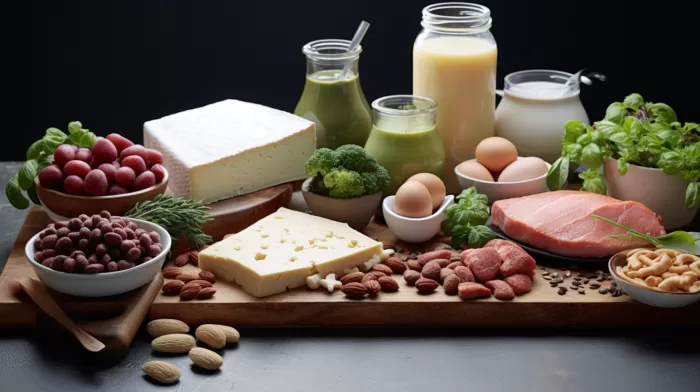Swapping empty carbohydrates or unhealthy fats for healthy protein is vital for optimal health, muscle growth, and weight loss. Consuming high protein foods will keep you fuller for longer, preventing food cravings and ultimately leading to weight loss.
Why a high protein diet?
Protein is an important source of energy for your cells. It aids in building muscles which helps to burn fat. Although your cells cannot directly use protein for energy needs, it can indirectly through gluconeogenesis, where protein is changed into glucose. Protein uses up twice as much energy in its conversion to glucose in comparison to carbohydrates or fats that are converted into glucose. This excess energy results in fewer calories being stored as fat.
Clinical studies reveal that high protein foods increase satiety and decrease your hunger compared with high carbohydrate foods. By reducing your calorie intake by about 10 percent while still satisfying your body’s energy needs, you’ll be able to experience weight loss.
Protein is composed of amino acids, which are the building blocks found in all your body cells. These include your blood, hair, nails, skin, and connective tissues. Protein is used to build and repair body tissues, make up vitamins, enzymes, and hormones. Amino acids also make up your DNA.
However, there are some cautions when it comes to consuming more protein, such as having kidney disease or low vitamin D levels. Before adopting a high protein diet, it’s recommended that you have your doctor check your vitamin D levels.
High Protein Foods
Sources of Consumers’ Beware protein in a high-protein diet typically include dairy, meats, poultry and different types of protein supplements.
- Soy
- Milk: 8 grams per 1 cup
- Tofu: 12 grams per 3 oz
- Edamame: 8 grams per ½ cup
- Beans
- 20+ grams per 1 cup
- Nuts
- Peanut butter: 8 grams per 2 Tbsp
- Mixed nuts: 27 grams per cup
- Whole grains (e.g., buckwheat, quinoa): 23 grams per 1 cup
-
Meats (per 3-ounce serving)
- Turkey breast: 24 grams
- Fish: 21-25 grams
- Chicken: 23 grams
- Beef/steak: 23 grams
- Ground beef (95% lean): 18 grams
- Eggs: 6 g per 1 large egg
- Low-fat dairy
- Greek yogurt: 23 grams protein, 7 grams milk sugars per 1 cup
- Cottage cheese: 14 grams protein per ½ cup
- Swiss cheese: 8 grams protein per 1 ounce
- Milk 2% milkfat: 6 grams protein per 1 cup
Smoothies
Smoothies are an excellent way to add more protein to your diet. You can add nuts, yogurt, and protein powder, as well as fresh and frozen fruits for a delicious and nutritious meal replacement.
Protein Powders
The recommended intake of protein for a person’s daily diet is 40 percent, along with 30 percent healthy fats and 30 percent complex carbohydrates. Protein powders can help you achieve this percentage.
There are various types of protein powders available, such as whey, casein, pea, soy, hemp, and brown rice protein powder. Each type has its unique benefits and sources. Some protein powders may also contain a blend of different protein sources. Choosing the right protein powder is crucial in achieving the optimal balance of nutrients to fit one’s needs.
The take-home message
Incorporating 40 percent of your meals with protein, along with mostly raw food from fruits, vegetables, seeds, nuts, and legumes, will set you up for a well-rounded nutrition plan. By including high protein foods and supplements in your daily intake, you can achieve muscle growth, weight loss, and maintain optimal health.



